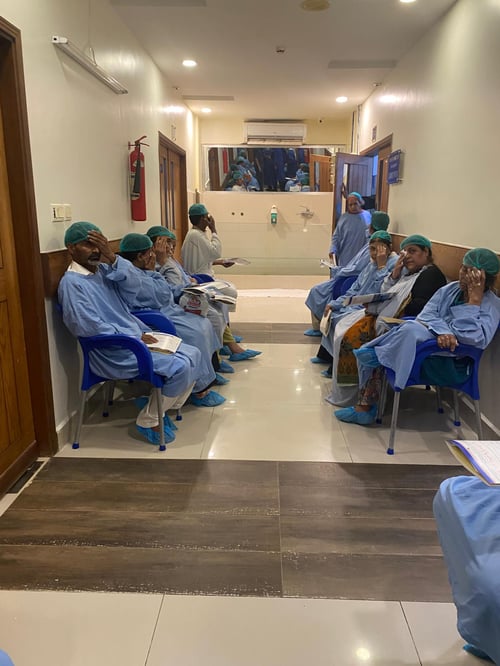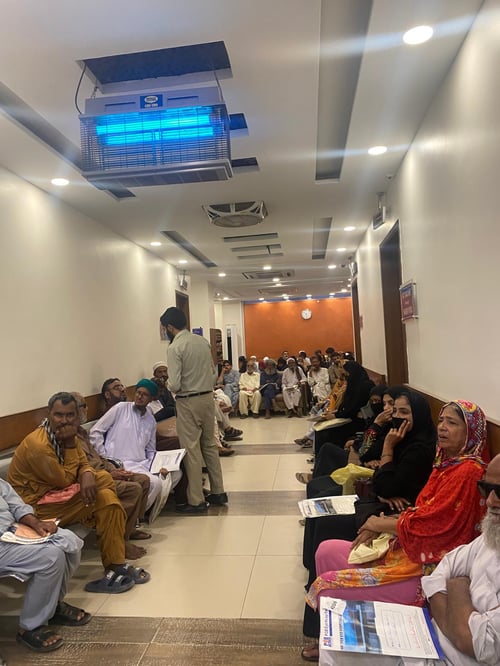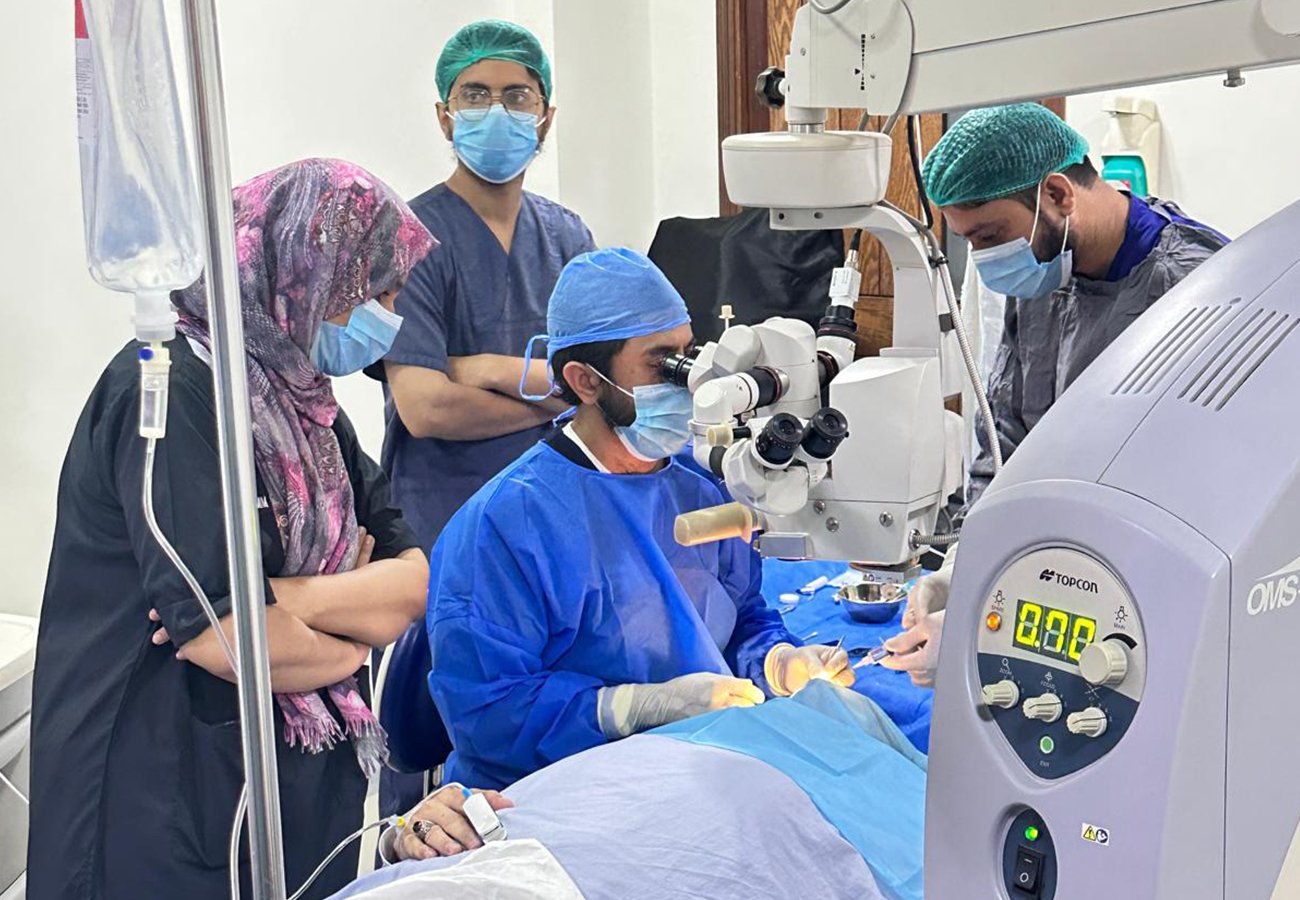Aug 8, 2025
Earlier this year, Abu-Bakar Zafar, MD traveled from Champaign, Illinois to Karachi, Pakistan for a medical service trip that would leave a lasting impact—not only on the patients he treated, but on himself as a surgeon, teacher and human being.
From April 24 to May 3, 2025, Dr. Zafar joined nearly 30 volunteers organized through FAJR Scientific to offer specialized medical care across multiple disciplines, including cardiology, general surgery, orthopedics, sports medicine, ophthalmology and more. The eye care team—comprising a retina specialist, a glaucoma specialist and Dr. Zafar, a cornea specialist—partnered with POB (Prevention of Blindness) Eye Hospital Karachi to provide services that weren’t otherwise accessible in the region.
Dr. Zafar performed 13 sight-restoring cornea transplants, 10 of which were made possible through Eversight’s global aid program—dedicated to extending the gift of sight to underserved communities worldwide. With this support, he carried out 10 DSAEK (Descemet’s stripping automated endothelial keratoplasty) corneal transplants, helping restore sight to 10 patients in need.
By partnering with local healthcare providers, Eversight helped bridge the gap between need and access, supporting Dr. Zafar in delivering sight-restoring surgeries to those who would otherwise remain in darkness.
“The procedures that we were able to offer are not offered anywhere in the city, and in very few places in the country. So, for us to offer that to patients was very rewarding,” Dr. Zafar said. “All the patients are super grateful. You could see the impact our work was having on those patients, and it was a very humbling experience. It helped us realize how privileged we are to have all the resources and to go somewhere where they have very, very limited resources.”

Delivering modern eye care where it’s needed most
For patients in the United States, partial corneal transplants like DSAEK or DMEK are the standard of care for conditions such as Fuchs dystrophy or PBK (Pseudophakic bullous keratopathy).
In Pakistan, however, limited access to corneal tissue and surgical equipment means patients often receive full-thickness PKP (penetrating keratoplasty) transplants—if they receive care at all.
"Everybody over there was ‘hand motion,’” Dr. Zafar said, referring to a way of assessing very low visual acuity based on the ability to perceive the movement of a hand in front of the eye, even if the patient cannot discern the hand's shape or count fingers. “They didn’t have any other resources. Here , patients with Fuchs dystrophy might come in with 20/40 or 20/50 vision. But over there, they’ve completely lost their independence.”
That difference hit home when Dr. Zafar met a man who had undergone complicated cataract surgery and was left blind in both eyes.
“He couldn’t function at all. He was being taken care of by family,” Dr. Zafar said. “Pakistan is a developing country, so the resources for the families are limited anyway and then if somebody is debilitated because they can't see, it makes things much harder.”
One of the most moving moments of the trip came just days after that patient received a transplant.
“He was able to–even after just two or three days–make out more faces. Within a week, some patients were able to start reading letters on the chart,” Dr. Zafar said. “It was a world of difference. They were very grateful we were able to help them, even if just for a few days.”

More than medicine: Sharing knowledge and building capacity
Dr. Zafar didn’t just bring corneal tissue—he brought knowledge and training. One of the primary goals of the medical service trip was to transfer surgical knowledge to the local team so that these procedures could continue long after the volunteers returned home.
“Yes, it’s always great to donate more tissue or expertise, but it’s also very important for them to continue on so that those surgeries don’t stop in that one week,” he said.
Before arriving, each specialist had a list of potential candidates. Dr. Zafar’s list included nearly 50 people, but time and resources allowed him to transplant just eight corneas himself and supervise two additional surgeries performed by a local cornea specialist.
“She did an excellent job,” Dr. Zafar said. “Hopefully their eye bank in Pakistan, which is working on preparing and dissecting tissue, will be able to continue this work.”
Dr. Zafar was also deeply impressed by the surgical skill of his Pakistani colleagues.
“In some ways, they were our mentors,” he said. “They were able to do complicated cataract surgeries and PKPs faster and more efficiently than us. They had techniques to teach us.”
A personal connection—and a powerful lesson
This trip had a special meaning for Dr. Zafar as his parents are from Pakistan. It was his first time doing international medical work, and the opportunity to help people from his family’s country was deeply fulfilling.
“I've been in practice for 10 years and went into medicine to be able to help people,” he said. “I went into ophthalmology specifically because it's a very gratifying field. It's one of the very few fields where you see instant results. It was very rewarding to be able to go back home and help those patients who have no resources whatsoever.”
For Dr. Zafar, this experience also reaffirmed the need for corneal tissue and instruments in Pakistan and allowed him to reflect on his practice in the U.S.
“Losing your vision can be one of the most debilitating chronic diseases a person can face,” he said. “To be part of a specialty that can restore that is very rewarding. We sometimes take it for granted–cataract surgery or corneal transplants. I did four of them about two weeks ago. It's routine. But we miss the impact that it can have on patients and going on these trips, being able to offer those services to people who can't afford it, who don't have the resources, who don't have the skill sets, it's very humbling to do that.”
Eversight’s role in global sight restoration
Eversight’s global aid program empowers surgeons like Dr. Zafar to restore vision and transfer surgical skills in communities that need it most.
The program also follows the United Nations Sustainable Development Goals (UN SDGs). While vision loss is debilitating, it doesn't affect everyone equally. Some communities have been left behind when it comes to eye care, like Pakistan. Eversight’s global work aims to increase equitable access to sight-saving care while strengthening long-term capabilities—one surgery, one patient, one training opportunity at a time.
“Eversight has always been very receptive to any needs,” Dr. Zafar said. “They helped me when I was first learning how to do DMEK and answered my questions. They were very generous in donating 10 tissues for this trip. The other subspecialities from other organizations were just shocked at how generous Eversight has been. I can’t thank them enough.”
A call to step outside your comfort zone
Dr. Zafar hopes his story inspires other medical professionals to consider volunteering in areas that need it most.
“I was apprehensive at first and somewhat scared because we live in a bubble where we're so used to the instruments, the skills, our staff, everything, and this was a new team, new patients, new environment,” he said. “But it turned out to be such a rewarding experience.”
He plans to continue volunteering with FAJR Scientific on future trips.
“There’s always a need,” Dr. Zafar said. “You just have to be able to step out of your comfort zone a little bit and you'll see how much you are able to gain. You're going to be helping other people, but you personally end up gaining so much in the experience yourself. You can see how much more impact you can have.”
Interested in supporting global sight restoration?
Learn more about how Eversight's global aid program is transforming lives around the world and give today to support this life-changing work.
Interested in receiving periodic news and updates from Eversight? We invite you to sign up to receive our emails.

